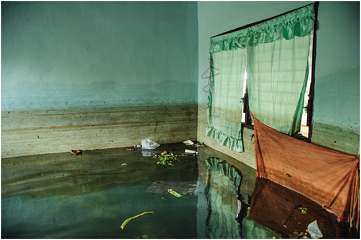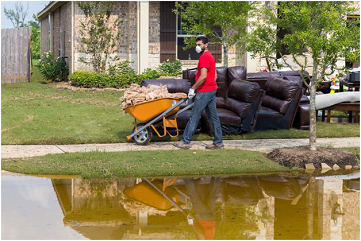
A residential flood can be caused by a burst main line, a plumbing backup, or Mother Nature. If there is excessive water damage, the effects can be devastating, regardless of the cause. In addition to ruined personal items, your home's flooring and walls may require costly repairs. Moreover, mold is more likely to grow in areas with excessive humidity and moisture.
After flooding, regardless of how big or small, there is a high risk of mold. Human health can be adversely affected by mold. A moldy environment may cause wheezing, red or itchy eyes, or a stuffy nose for the average person, while allergies and asthma will cause severe reactions for those with these conditions. Mold-related infections can also affect individuals with weakened immune systems. Mold can grow on cardboard, insulation, drywall, carpet, fabric, wallpaper, wood, and paper. To prevent mold growth, these items should be removed from your home within 24-48 hours of flooding.
Post-Flood Cleaning Tips
Although the cleanup process may seem intimidating at first, you can work through it step by step to ensure the safety of your family and the restoration of your home.
Disconnect Your Water and Power
Be sure your home's electricity has been turned off before you start rummaging through soaked personal items. You can do this using your circuit breaker or main switch. You should also shut off your water if the flooding was caused by a plumbing issue. Don't hesitate to contact your utility provider if you need assistance with either of these tasks.
Assess Structural Damage
Consider whether there are any structural concerns that could pose a safety threat before entering the room. You should inspect the foundation before you re-enter the house for loose, warped, or cracked elements.
Take Pictures
Flood damage is rarely covered by homeowners' insurance alone. It is often necessary to purchase flood insurance. Nevertheless, flooding caused by a line break or backup may be covered as "water damage." Before moving or replacing anything, take plenty of photos of the damage. Your coverage will be more effective if you do this.
Remove Excess Water
You may be able to remove excess water using towels, mops, or buckets, depending on how extensive the flooding is. If you want to dispose of gallons of water at once, make sure your plumbing can handle it. You may have to find another solution if the plumbing was damaged or caused the flooding in the first place.
A wet/dry vacuum or sump pump may be necessary if you have more than an inch of standing water. You can rent both items from a hardware store. Just make sure the electricity is safe to use before connecting them.
Dry and Disinfect
Once the excess water has been removed, start drying items and decide if they can be salvaged or disposed of properly. For drying carpets and upholstery, dehumidifiers and fans can be helpful. Open windows, curtains, and doors to ventilate the area as much as possible. To prevent mold and bacteria growth on hard surfaces and non-upholstered furniture, such as tables, tile flooring, and metal appliances, should be disinfected with a bleach solution or non-ammonia detergent after drying.

Disposing of Ruined Items and Debris
Disposing of ruined electronics, carpeting, furniture, and drywall is one of the final steps in flood cleanup. Many of these items are difficult to get rid of, and you may not even have the means to do it yourself. Depending on the situation, you may even need assistance with the cleanup after a flood. It’s a big job to do on your own and could be dangerous. With AAA Rousse, you don't have to worry about a thing.
Flood damage cleanup and hauling are among AAA Rousse's most important services. Flood damage cleanup and hauling are very serious matters. Completing the task requires considerable time and effort. Fortunately, our crew is well-equipped and has the resources necessary to complete the task efficiently and correctly.
Our team is ready to assist you if you require flood damage cleanup and hauling services. We provide same-day flood damage cleanup and hauling services in Florida. You can rely on our team of highly qualified, licensed, and insured professionals to remove any trash or debris from your home.





